HOUSTON PRESS
March 9, 2006
Try as you might to avoid the heinous hippie-cliché “cosmic” when describing the music of I See Hawks in LA, when the melodies, lyrics, harmonies and licks take over, you’ll find yourself lost in some greater-than-the-sum-of-its-parts moment. The Hawks’ new disc, California Country, would make an appropriate score for Thomas Pynchon’s Vineland: The pace is trance-inducing, the stories transfixing, the vibe completely Californian.
“Slash from Guns N’ Roses” doesn’t just mock L.A. life–it bitch-slaps the entire concept of West Coast pop, and “Barrier Reef” is the best anthem to Cannabis sativa since “Humboldt” (from the previous Hawks record, Grapevine). These guys even have the cojones to snipe at the Lone Star State in the form of “Houston Romance” (which they swear is mostly true). And, really, who could disagree with a lyric like “Texas City, Corpus Christi, it’s not the humidity, it’s the humanity / it’s not the insensitivity, it’s the insanity / Corpus Christi, Texas City?” This will also certainly be the only alt-country disc this year to contain a line like “Nixon was headin’ to that big white house / and the bombs would soon be droppin’ on the children of Laos.” Seldom has there been an album with such joyous music-making, such corrosive, acid-etched lyrics. Way cosmic.
— William Michael Smith

Extraordinary album.
— Michael Simmons, L.A. Weekly writer

Ja, so kann’s laufen, wenn man aus einer Bierlaune heraus und ohne große Ambitionen ein musikalisches Projekt aus Spaß an der Freude ins Leben ruft und im Laufe der Jahre zu mehr als einem bloßen Geheimtipp der südkalifornischen Alternative-Countryszene heranwächst.
Unglücklicherweise blieb mir die Combo mit dem außergewöhnlichen Namen I SEE HAWKS IN L.A. bislang ebenfalls unbekannt. Doch schließlich darf man sich auf die wohlgemeinten Tipps der europäischen Roots-Gemeinde verlassen, und sich kurz darauf ganz unvoreingenommen am pressfrischen Exemplar des dritten I SEE HAWKS IN L.A.-Albums erfreuen. Rob Ellen, der schottische Mentor und Agent der Kalifornier, durfte sich dann, befragt nach meinem ersten Eindruck, auch über ein relativ euphorisches ‘Love at first sight’-Statement meinerseits freuen.
Die HAWKS, die durchweg auf die Songwriter-Qualitäten ihrer beiden Köpfe, Rob Waller und Paul Lacques vertrauen, machen es einem aber auch sehr leicht, sie zu mögen. Sie spiegeln quasi sämtliche Vorzüge, die eine mitreissende Country-Band benötigt wider: Lust und Laune, tolle Songs, die gleichermaßen Tradition und Moderne vereinen, beeindruckende Vielfältigkeit und Geschicklichkeit im Umgang mit ihren Instrumenten, variabel gestalteter Gesang samt ansprechender Harmony-Vocals, völlig unerwartete musikalische Überraschungsmomente und ausgefuchste Lyrics, die fernab jeglicher Klischees die Finger z.B. in politische Wunden legen, amerikanische Historie verarbeiten oder auch mal mit einem zynischen Lächeln die L.A.-Celebrities auf’s Korn nehmen.
Allein die Texte der HAWKS sind derart unterhaltsam, dass sie schon zum Tipp des Monats ausreichten. Doch eine absolute Top-Band zeichnet sich letztlich dadurch aus, dass sie anspruchsvolle Lyrics mit der nötigen Portion Esprit und musikalischem Know-How transportiert. Und dies gelingt I SEE HAWKS IN L.A. auf ihrem neuen Album “California Country” vorbildlich und mit wohltuender Leichtigkeit.
Die Kalifornier decken die komplette Bandbreite der amerikanischen Country-Musik stilecht ab. Ihr Spektrum reicht von Country-Rock bis Honky Tonk, von Bluegrass bis Folk und pendelt ständig zwischen ernsthaften und amüsanten Themen. So schaffen es die HAWKS mitsamt ihrer erlesenen Gästeliste, die u.a. auf Namen wie Chris Hillman, Rick Shea und Tommy Funderburk zurückgreift, ein spannendes und mitreissendes Album zu komponieren und setzen die Meßlatte für die zahlreiche Konkurrenz wieder ein Stückchen höher.
Wenn man überhaupt noch vom Insiderstatus dieser Combo sprechen darf, dann sollte sich dieser demnächst in alle Winde zerstreuen. Jedenfalls würde ich mich nicht wundern, sie demnächst in den Euro-Americana-Charts auf den vorderen Plätzen zu sehen.
— Frank Ipach, (Impressum, Artikelliste), 13.03.2006
“Well, get a load of this: coming on like a more muscular version of the Flying Burritos, the Hawks have all the ingredients that’ll have you purring with happiness. The country roots come through strong but they like to rock a bit too; the lap steel of Paul Lacques plays a leading role and there’s frequent two and three part manly country harmonies. There’s banjo, mandolin, dobro and fiddle but also swirling organ and electric guitar solos for the rock side of the equation. So, we’ve got country rock here, re-configured for the new century and harder edged, musically at least, than the Eagles/Poco etc. school of country rock.
“The songs are written for the most part by Paul Lacques and Rob Waller, the latter being the lead vocalist. They have a knack of writing songs with a singalong hook that disguises a frequently dark lyrical heart; they’re not exactly bleak but they do take a sceptic’s view of the world. In ‘Midnight in Orlando,’ disillusioned with Disneyland and the self-improvement conference he’s attending, the protagonist heads for the swampland : ‘where at least I know what’s dead; the animals they don’t greet you, they just eat you instead.’
“As that indicates, they pick unusual material; perhaps most surprising is ‘Byrd From West Virginia,’ a song of praise and affection for the aged Senator Robert Byrd who has been trenchant and persistent in his opposition to Dubya’s Iraqi adventure. The most fun is ‘Slash From Guns’n’Roses,’ which takes the mickey out of L.A. society in a gloriously over-the-top folk ballad as rock and roll style.
“This is fun stuff, and a good sound to have around – especially if you’re a fan of the pedal steel.” ********* 9 STARS OUT OF 10
–John Davy, Whisperin & Hollerin, UK
Can you read Dutch? If so, click here:Kosmische country met aparte songteksten.
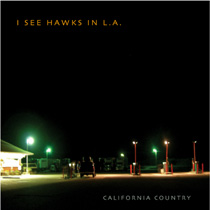
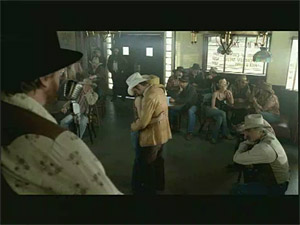
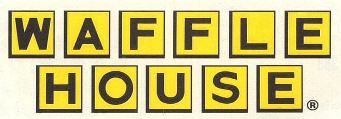

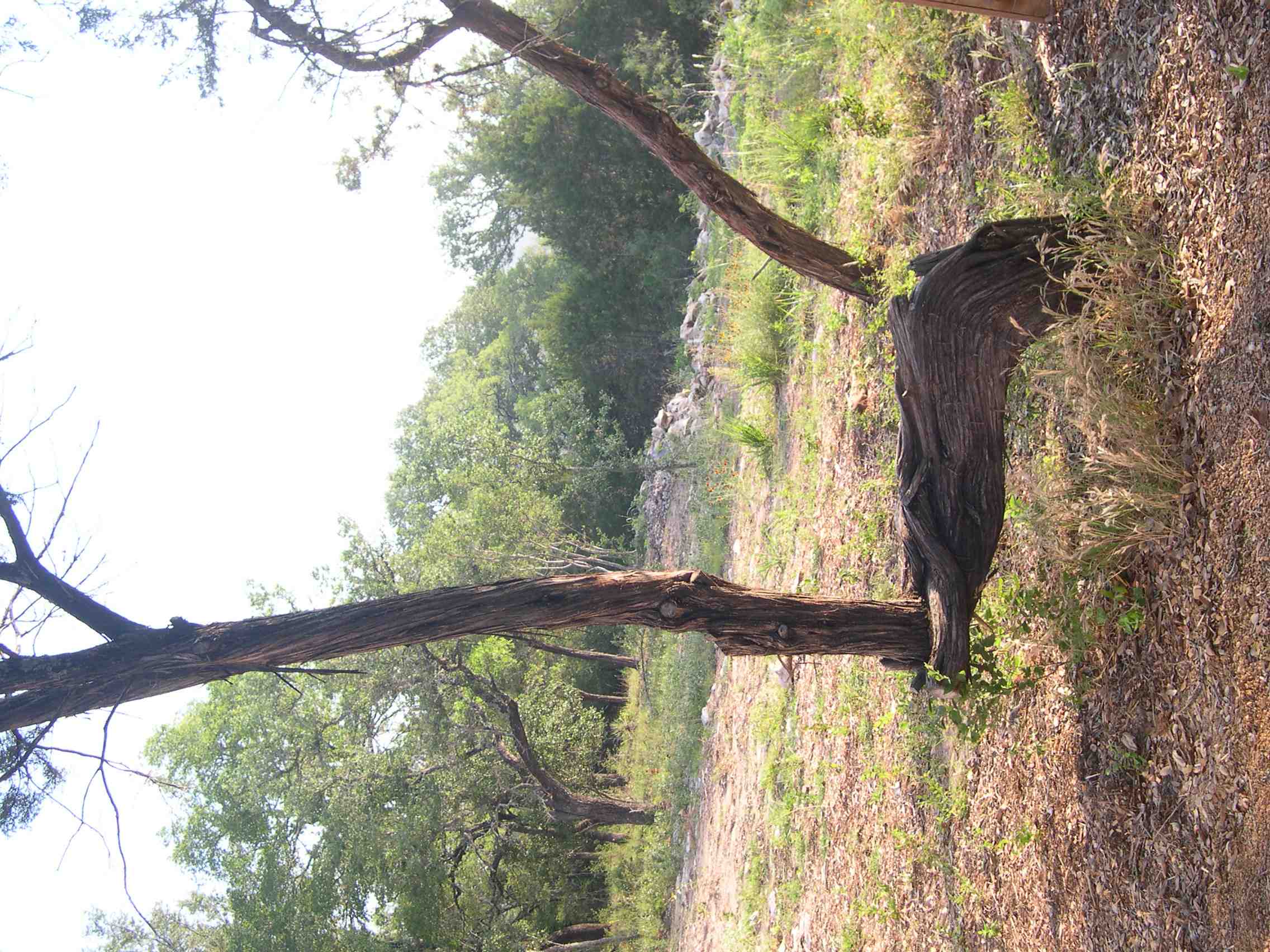 The Hawks wandered down the bluff with Geoff to the Pedernales, an ever changing flow now at low ebb from a long drought, with twigs in the trees 15 feet above showing the high water mark. It was easy to imagine cowboys chasing stray calves out of the river sand, and Indians hunting antelopes.
The Hawks wandered down the bluff with Geoff to the Pedernales, an ever changing flow now at low ebb from a long drought, with twigs in the trees 15 feet above showing the high water mark. It was easy to imagine cowboys chasing stray calves out of the river sand, and Indians hunting antelopes.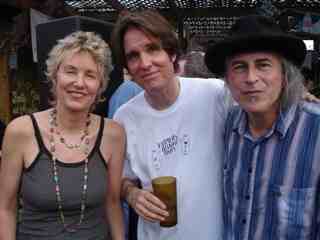


 —–
—–